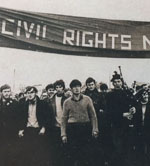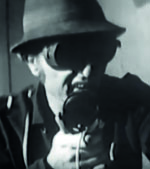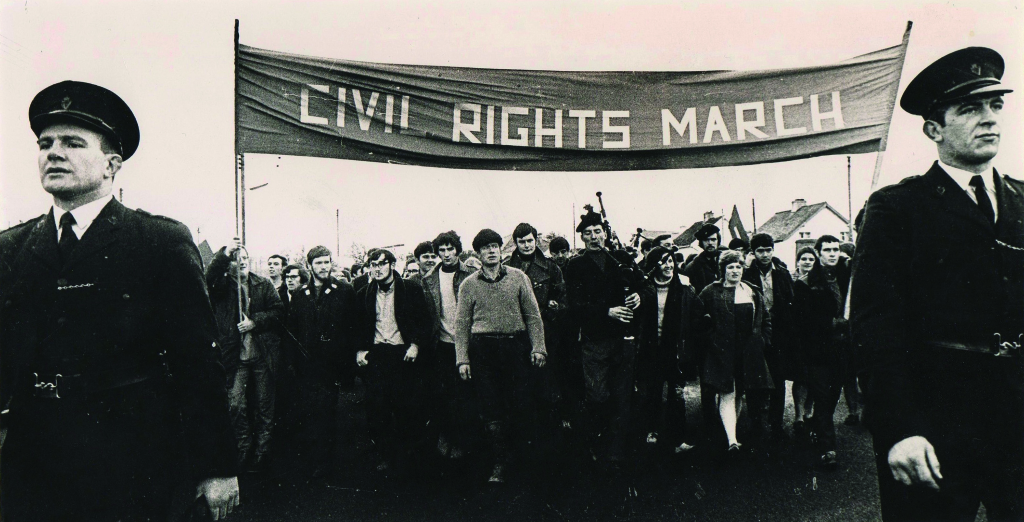 On July 3 1968 they blocked the lower deck of the Craigavon Bridge in Derry and sang ‘We Shall Overcome’. Most likely it was the first time the song had been used on the island for a disruptive purpose. Half a dozen people sat down on the disused railway lines, halting the official opening of this new route for cars across the River Foyle. Thus, they denied the new Unionist Mayor of Londonderry, Councillor William Beattie, his civic role.
On July 3 1968 they blocked the lower deck of the Craigavon Bridge in Derry and sang ‘We Shall Overcome’. Most likely it was the first time the song had been used on the island for a disruptive purpose. Half a dozen people sat down on the disused railway lines, halting the official opening of this new route for cars across the River Foyle. Thus, they denied the new Unionist Mayor of Londonderry, Councillor William Beattie, his civic role.
The Derry Housing Action Committee favoured direct action. One of the organisation’s movers, Eamonn McCann, had spent the previous three years in London, where he’d been party to the Vietnam Solidarity Campaign and the International Socialists. He’d returned home in March to meet with a sister, back on holiday from Canada. Then his old friend Dermie McClenaghan told him about John and Billie Wilson’s wretched life in a caravan on Donaghy’s Row and he decided to agitate in Derry instead.
By July, the Wilson family had been successfully rehoused at 417 Bishop Street and 11 of the DHAC protestors – including a Labour candidate, Janet Wilcock – had received summonses under the Road Traffic Act 1930. The hearing was set for the very same day of the protest on the Craigavon Bridge. This was an endorsement, rather than a deterrent. They occupied the bridge and carried their placards. One of these read ‘HITLER-FRANCO-BEATTIE’. Eamonn recalls the effrontery:
‘The opening ceremony was to take the amazing f**king form of Mayor Beattie walking from one edge of the bridge to the other, which is about 350 yards long, and ceremonially, that was it. He was a straightforward, Unionist party, Orange Order man. I am not going to miss a chance like that so we’re in there, John Magee and Fionnbarra ÓDochartaigh, Dermot McClenaghan and the rest of us.
‘I think that ‘We Shall Overcome’ made its way quite spontaneously and I think the main reason for it is it is the easiest song in the world to learn. It is a very, very simple tune, very simple words and in fact it doesn’t even matter if you sing the verses in the right order. It is a perfect song for that. Usually, in those situations it would be ‘Kevin Barry’ or more likely ‘The Soldier’s Song’ or something like that.
‘I remember immediately thinking, ‘This is a bit different’. ‘We Shall Overcome’ – we shouldn’t be singing that. That is the black people in America. But there was something romantic about that because it suggested that what we were involved in was much wider and more noble struggle, rather than just fighting about things about Northern Ireland.’
Fionnbarra ÓDochartaigh, the DHAC Committee Secretary, had caused ructions at Corporation meetings a few weeks before. Now, one of his duties on the bridge on July 3 was to lead the singing. He would guide the activists through a song that was relatively fresh to Irish ears.
‘We pretended to be spectators,’ he says, ‘coming along to welcome the Mayor. We had placards up our jumpers and under our coats. Just as he was supposed to cut the ribbon we jumped out in front of the cavalcade of cars.
‘About six sat down – they volunteered to block the bridge, but we couldn’t all do it. The rest of us were at the side, to cheer them on. At that stage the police arrived and people didn’t know what to do. I just stepped forward, singing ‘We Shall Overcome’. Very people knew the song at that time. Some of them would have known the chorus, but they didn’t know all the verses.’
‘We Shall Overcome’ may not have been familiar to some of the Derry activists but it was the most resounding protest anthem in America. It had been sung on freedom rides and at sit-ins, in union halls, churches and rallies. It could be traced back to 1900 and a gospel song called ‘I’ll Overcome Some Day’, published by Charles Albert Tindley. He was a Methodist Minister in Philadelphia, the son of a slave and many of his parish had also come north to rid themselves of the associations from that era.
It was a song about spiritual deliverance, about salvation for every soul that did not yield to temptation. Within ten years, striking miners were singing a version of it and by 1945 it had evolved into a union tune, ‘We Will Overcome’, performed at the end of a day on the picket line. Lucille Simmons sang it slow and heartfelt with the female tobacco workers in Charlestown, South Carolina. A union worker, Zilphia Horton, brought it to the Highlander Folk School in Tennessee, where emerging leaders in the movement were given support and training. The song was finessed there with the help of Guy Carawan and Pete Seeger, who published it in 1947 and who also helped with the lines about walking hand in hand, plus the title change to ‘We Shall Overcome’. When you sang the word ‘shall’, your mouth opened wider and it sounded like you meant it, even more.
Seeger was a great ambassador for music with a message and he sent the song out into the world. The lyric was no longer about getting a reward in Heaven. This version called for justice on Earth. The call was for collective action and the reassurance that comes with it. Fear was part of the experience, but the people would prevail. The spirituality had not left the song – it still carried a deal of deep conviction. Now, the sentiments put faithful feet on the road; it was empowering and it proclaimed peace.
In 1960, the song was adopted by the Student Nonviolent Coordinating Committee. Three years later and Bob Dylan sang it at the Newport Folk Festival, on stage with Peter, Paul and Mary, with Joan Baez and Pete Seeger and the Freedom Singers from Albany, Georgia. They were joined by Theodore Bikel the actor, singer and festival co-founder. It was July 26 and the folk revival was alive and alert. They all crossed their right arm over their left, took the hands of their neighbours and presented an accord of black and white, north and south, various creeds and ethnicities.
Joan Baez took ‘We Shall Overcome’ to the March on Washington on August 28 and an audience of more than 200,000. It was the soundtrack to the Selma to Montgomery marches in 1965 led by Dr Martin Luther King Jr., asking for voting reform on behalf of the Civil Rights movement. He used the lyric often in his speeches, including his final public address on March 31 1968, four days before his assassination. Tens of thousands then sang it at his funeral.
Pete Seeger was in awe of this ongoing development: ‘I don’t think there was any political movement in history that had as much singing as the Civil Rights movement had.’
Now it was being transplanted to Northern Ireland. Not without a challenge, though. Fionnbarra ÓDochartaigh led the singing on the bridge yet he had barely finished the first verse when officers from the Royal Ulster Constabulary (RUC) caused him to desist. The other protesters continued for a bit but they were also halted and taken away to Victoria RUC Station. Two individuals, Neil O’Donnell and Roddy O’Carlin refused to sign a bail bond and were sentenced to a month in Crumlin Road Prison, Belfast. There was a fine of £5for ÓDochartaigh. His work in conducting the peace anthem was filed as ‘disorderly behaviour’.
Fionnbarra had been living in London in the mid-60s when he had learnt about the ongoing Civil Rights actions in America. He was selling The Irish Democrat, the newspaper of the Connolly Association, around the pubs. At the same time, Eamonn McCann was editing a Trotskyite paper, The Militant, on behalf of the Irish Workers Group. He and songwriter Christy Moore used to sell it at Hyde Park on Sundays. Both publications were taking heed of Martin Luther King’s example. The Irish Democratalso published the lyrics of radical songs, so the connection was underlined.
They sang the song again on the road from Coalisland to Dungannon on August 24. This was the first significant march from the Northern Ireland Civil Rights Association (NICRA), formed 18 months before. Again, an important theme was the fair allocation of housing. A related issue was ‘one man, one vote’, rather than a property qualification that favoured rate-payers and businesses. NICRA opposed the gerrymandering that went with the loaded, political arithmetic of Northern Ireland. NICRA wanted to see fairness in job opportunities, the disbandment of the quasi-military Special Constabulary (B-Specials) and the repeal of the Civil Authorities (Special Powers) Act (Northern Ireland) 1922. This broad, albeit left-leaning Civil Rights alliance included free-thinkers, Republicans, socialists, liberals and revolutionaries. Hence the value of a decent anthem. ‘We Shall Overcome’ was a wishful cover-all, a non-violent aspiration wherein they might find a common chorus.
When Frankie Mooney, the Derry tenor, sang the anthem at the Guildhall, Fionnbarra was nearby to prompt him on the verses. The latter was also duplicating the lyrics for public events and using the DHAC newsletter, Reality, to bed the song into the Derry psyche. He had no doubt about the song’s value: ‘It was important because when you’re on a march it gave people a sense that we’re all together in this, we have to see this through. You just couldn’t walk along silently. It kept our spirits up. The songs had a part to play. You can’t put it in material terms. You have to see it in emotional terms.’
‘I Shall Not Be Moved’ was another song that had grown out of the American gospel experience and a verse from the book of Jeremiah about a tree by the river, nourishing the roots. ‘I’ was changed to ‘We’ as the song went secular. This was put to use as the People’s Democracy march set off from Belfast, on January 1, destination over 70 miles away in Derry. Around 40 people at the start, but numbers grew along the way.
After the ambush at Burntollet, the marchers took the final stretch into Derry, past another attack in the Waterside area on the near bank of the Foyle. Now they were singing ‘The Internationale’, a 19th Century song of solidarity. ‘Arise ye workers from your slumbers,’ they chanted, ‘Arise ye prisoners of want’. Fionnbarra takes some of the credit for this development:
‘I went on the Burntollet march and I joined up with it at Antrim. I seemed to be the only one in that crowd that knew ‘The Internationale’. I spent most of my time teaching it to people. So, by the time that we reached Derry, three days later, a lot of them knew it. When they got to the Guildhall, it wasn’t ‘We Shall Overcome’ but ‘The Internationale’. It was quite symbolic. It seemed to echo off Derry’s walls.’
 Around 7pm on January 10 they plugged in a pirate radio transmitter that had been smuggled up from the Irish Republic by friends of People’s Democracy. The transmissions were a feature of 1969, firstly from the Creggan and then from the top of Rossville Flats, an eight-storey feature of the Bogside. The equipment was installed by Jim Sharkey, an electrician from Rossville Street. Radio Free Derry went out on 240 Medium Wave and involved Eamonn McCann, Eamonn Melaugh, Tommy McDermott, Ross O’Kane and a few others. Their reach was the Creggan, the Bogside and the Brandywell – 888 acres and 25,000 people. They played folk tunes, pop music and they talked about resistance.
Around 7pm on January 10 they plugged in a pirate radio transmitter that had been smuggled up from the Irish Republic by friends of People’s Democracy. The transmissions were a feature of 1969, firstly from the Creggan and then from the top of Rossville Flats, an eight-storey feature of the Bogside. The equipment was installed by Jim Sharkey, an electrician from Rossville Street. Radio Free Derry went out on 240 Medium Wave and involved Eamonn McCann, Eamonn Melaugh, Tommy McDermott, Ross O’Kane and a few others. Their reach was the Creggan, the Bogside and the Brandywell – 888 acres and 25,000 people. They played folk tunes, pop music and they talked about resistance.
The playlist had space for the Spinners and local artist Majella Brady. Their station theme tune was a recent release called ‘The Derry Civil Rights’ song on a Monaghan indie label, Shamrock. The band was the Moonlighters, a reference to the secretive Kerry insurgents during the land crisis of the late 19th Century. The tune was on loan from ‘Down by the Sally Gardens’ and the lyric (apparently written by Tony O’Doherty, a DHAC campaigner and songwriter from Lone Moore Road) was a fairly restrained account of the October 5 March. It was the first recorded trouble song of the looming conflict.
‘The police were there in hundreds and on mercy they did frown
As they freely used their batons that day in Derry town.’
Radio Free Derry name-checked the vigilantes and sent out peaceable messages to their Protestant neighbours in the Fountain area. ‘Why do you stone us when some of you don’t have the vote, when your houses are in a disgusting condition?’
And then some more Elvis, getting urgent with ‘It’s Now or Never’. The DJ added some banter at the end of the tune, ‘which may or may not have any relevance to the Civil Rights campaign, but it was the only song on the gramophone at the time’.
So, music was a feature in the dramatic churn of events. Anne Devlin recognised this:
‘It sort of carries you. You are out of the shallows and there you are in the new thing and you can’t go back. That’s the point, you don’t go back. And I find that really extraordinary
There was much for Eamonn McCann and his colleagues to consider also:
‘October 1968 was almost like a mass endorsement of what this tiny gang of left-wing people had been preaching in Derry and trying to put into practice. We were saying, “It’s a Housing Action Committee, we are going to concentrate on that, no green stuff”. We just told people to fuck off who were coming along, talking about tricolours – “F**k off”. At the Burntollet march, the tricolours went off the march. Consensus, you know – “Take that down, it’s not happening”. So, October 5 represented what we thought at the time was an explosion of activist radicalism that could sweep over sectarianism.
‘You got a glimpse of north and south rising up together, about economic and class issues – that’s the answer. I still believe this. I still fervently believe that is the only thing that is going to make Ireland united. They can fuck off with their armed struggle and their “We’ll negotiate with the European Union, that’s what will do it”. October 5 was a really buzzy experience. To think the future is going to look like something as we envisage it. Also, the sense of mass participation, that we were making the future ourselves. I was coming back from London, from a Trotskyist position which held that workers have to create socialism themselves. Only in rising up themselves could people slough off what Marx called the muck of ages – all the ideological things, nationalism and chauvinism and all the other things that weigh down on people.
‘And I thought I was seeing it happen. That is a very heavy thing to happen to you when you are in your 20s and you are totally committed to what you are doing. So, in that sense, it was an epiphany for me. It was an epiphany that didn’t last very long, you know, because within 18 months ‘We Shall Overcome’ was gone, it was ‘The Soldier’s Song’, ‘Kevin Barry’ and so on. And for a couple of years – sort of wasted years when I look back on it now – I was arguing against that in the Bogside. When I look back on it, I was never going to win the argument. People just thought I was an eccentric.’
Nevertheless, Eamonn had carried out his wish to ramp up the political situation in Derry and beyond.
‘Whether it was by wise means or not, history will judge.’
(This is an extract from Trouble Songs: Music and Conflict in Northern Ireland by Stuart Bailie. It is available at www.troublesongs.com and also on Amazon, plus various Irish bookshops, including No Alibis. Little Acorns and Waterstones).








 Twitter
Twitter